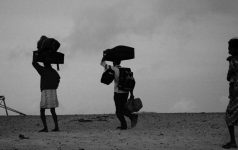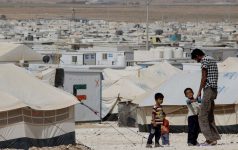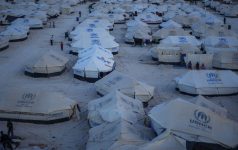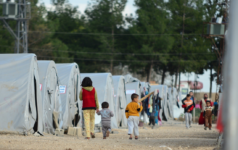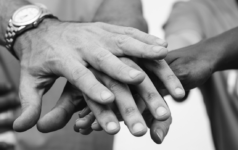Dalberg uses cookies and related technologies to improve the way the site functions. A cookie is a text file that is stored on your device. We use these text files for functionality such as to analyze our traffic or to personalize content. You can easily control how we use cookies on your device by adjusting the settings below, and you may also change those settings at any time by visiting our privacy policy page.
People migrate in pursuit of a better life for themselves and their families. While there are common motivations that many migrants share, each person migrates for unique reasons and frequently only makes the decision to leave their home when staying is no longer a viable option. This global phenomenon has existed for centuries and been an important driver of global welfare. It is not a crisis. Migrants create companies and jobs, promote development by sending remittances to the families who remained in their country of origin, and enrich the communities where they live. When managed well, migration brings opportunities to both countries of origin and countries of destination.
On World Refugee Day, however, we must recognize the vast human cost incurred when migration is not managed well. Developing an effective strategy to support migrants can be daunting because the needs of migrants vary enormously, based on a set of intrinsic and extrinsic factors that are unique to each individual. In our conversations with migrants, we’ve heard a range of stories that illustrate the combination of motivations that influenced a migrant’s decision to leave their home as well as the wealth of assets they brought with them.
- Honduran migrants who had returned from the United States shared that the main reasons for leaving their home when they were younger were insufficient employment opportunities and crime in Honduras. “When you turn 25, no one will offer you a job because you are too old,” said one person. “I have four kids, all of them graduated from college, but none of them have jobs,” shared another. “I have a job, but make just enough to live,” shared a third. They also shared fears for their lives: “We leave or we are going to get killed.”
- A Syrian woman in her early 20s had been a student of psychology in her last year at university before fleeing for Turkey. She told us that her family decided to leave Syria after her mother was taken in for questioning. Her mother was eventually released, but was warned that the whole family would be under continuous supervision. Her family left with what little they could bring to their neighboring country, Turkey, seeking safety. She was a volunteer at the Syrian Arab Red Crescent before her family migrated and is now a volunteer with the Turkish Red Crescent Society.
- A migrant from Myanmar, now living in Thailand, explained that she had lived with her grandmother and the grandmother’s ten other grandchildren before leaving. Her grandmother was a shop-keeper and very poor. As the oldest granddaughter, she had to drop out of school and help her grandmother at the market to enable her younger sister and brother to go to school. She had moved to Thailand hoping for better economic opportunities, despite her grandmother’s opposition.
- A group of Somalian migrants in Nairobi explained that the security situation in their home country had prompted them to leave. Most of them had relatives who had lost their lives or whom they have not been able to trace due to the ongoing conflict.
Effective responses to migration must consider the specific needs of each individual. Dalberg developed a light-weight assessment tool to help organizations design strategies that account for this range of needs. We drew upon a resilience framework that prioritizes the ability of migrants to respond to unexpected events. To be resilient, migrants must possess or be able to access financial, physical, human, social and natural capital and live within a regulatory and governance system that recognizes their fundamental rights. Figure 1, below, shows how each of these factors may vary and influence a migrant’s need for support.
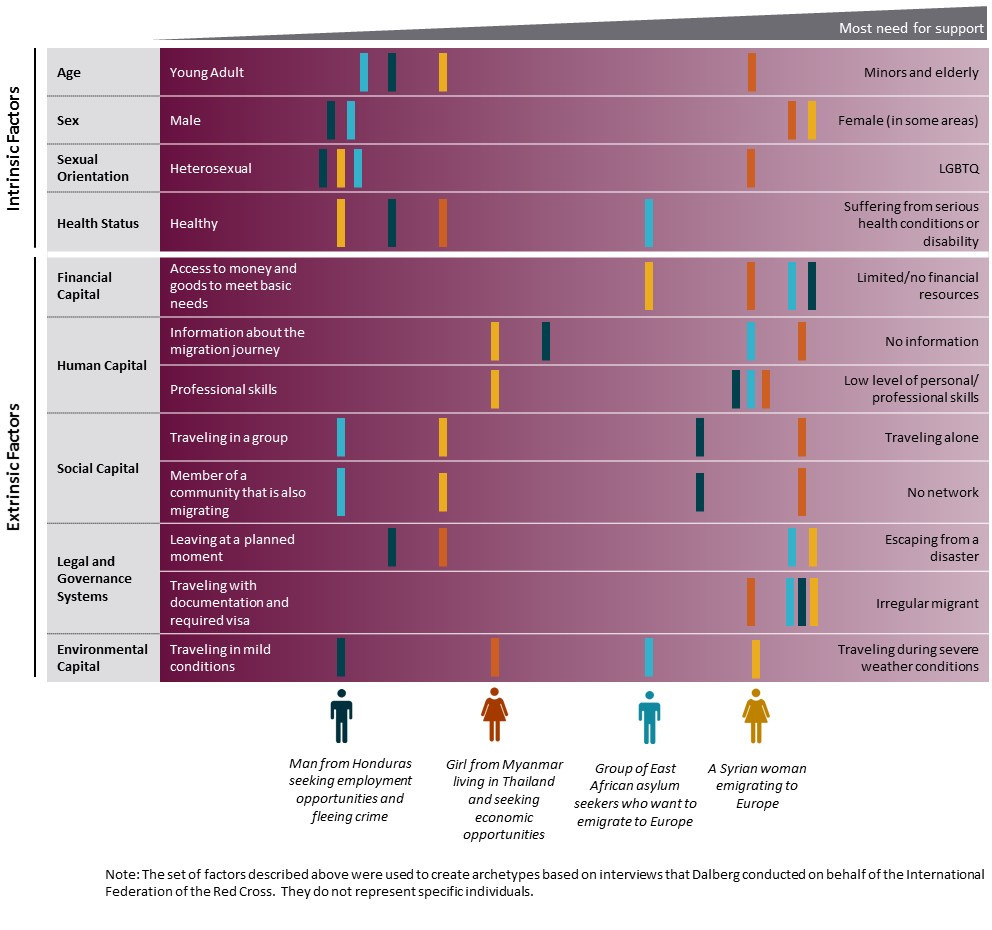
While the situation of each migrant varies, some common themes stand out.
- Migrants possess assets. When migrants travel, they carry with them talents, social ties and knowledge that are essential to their survival during the journey and their ability to effectively integrate into communities when they arrive. Recognizing the importance of these resources – and the increased vulnerability of people who lack them – is critical for effective management of migration.
- Migrants need information and resources to make choices that are right for them and their families. Solutions should provide accurate and timely information and promote the creation of markets that enable migrants to allocate resources as they see fit. Innovations such as cash transfers, mass text messaging, and the availability of charging and Wi-Fi stations are important to consider alongside more traditional activities such as providing shelter, food and health care.
- Migrants’ needs change dramatically during the journey. Throughout their journey, migrants require different types of external support. For example, when a migrant decides to leave his or her country of origin, the regulation of borders and access to information is of paramount importance. When he or she attempts to cross international borders, is waiting at migrant camps, or is arriving in a new country, physical capital including shelter, food, and access to health care, becomes more important. At the final stages of the journey, when the migrant is integrating into a new society or returning home, the ability to earn an income (including acquiring relevant skills and being granted the opportunity to work) becomes critical. This pattern of needs is common to migrants irrespective of why they are migrating or where they are migrating from and to.
The complexity of the task at hand can be daunting. This framework helps development and humanitarian organizations to identify needs and design innovative strategies that meet migrants needs, improve the management of migration, and allow migrants to successfully join new communities or return home. We recognize the ongoing need to learn about, share and scale many more smart initiatives. We call for actors who work with migrants, or who want to work with migrants, to contribute to the space by sharing their smart practices in migration.
Together, we can help shift the needle towards more holistic, empowering, and sustainable responses.

